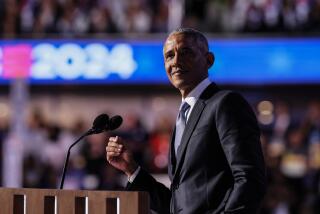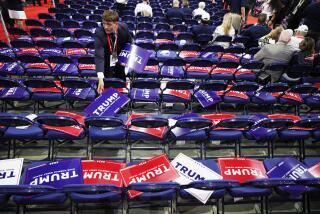Battles Technocrat Image : Dukakis Softens Tone to Project Compassion
- Share via
MOORLAND, Iowa — Michael S. Dukakis, the tightly wound governor of Massachusetts, stood before an early morning gathering in a frigid machine shed here and sought to project compassion.
“I’m instinctively for the little guy in this country,” Dukakis told the audience, most of them family farmers. “These are the people I want to protect, these are the people I want to help.”
It is a softened message that Dukakis, seeking to overcome his image as a humorless technocrat, has been promoting at every opportunity in his campaign for the Democratic presidential nomination. Once inclined to emphasize his managerial success as governor, Dukakis has adopted a new stump speech and television commercials to project human warmth.
It is a shift in emphasis rather than a wholesale change, a variation on the campaign’s central theme of economic growth and expanding opportunities. But the change in tone nevertheless suggests a perception by Dukakis that his emphasis on competence must be complemented by a more timeless--and traditionally Democratic--demonstration of caring.
The commercials that used to depict Dukakis as “a strong leader for a strong America” now stress how he would be a compassionate President, and the stump speeches, which used to focus mostly on the economic “miracle” in Massachusetts now include emotional appeals about the problems of adult illiteracy and homelessness.
Part of Dream
“We’re all part of the American dream, folks,” Dukakis has been telling audiences across the country, “and the real question for us in 1988 is whether that dream is going to become real for every single citizen of this country no matter who they are or what color their skin--that’s the real issue.”
Dukakis’ aides say that his message has been more consistent than that of other candidates. But the new commercials and speech were necessary “to make the Dukakis economic argument understandable to ordinary people,” said media adviser Dan Payne. “We wanted people to understand what he means, who he has in mind.”
In a television commercial that began airing in Iowa last week, a teen-age boy named Jimmy stares forlornly into the night from his job in the kitchen of a pizza parlor. Jimmy, the audience is told, was accepted to college but his family could not afford to send him.
‘Wants to Help’
“There are a lot of families like Jimmy’s,” the narrator says, “Mike Dukakis wants to help. . . . If a kid like Jimmy has the grades for college, America should find a way to send him.”
The advertisement, which promotes Dukakis’ proposed College Opportunity Plan, a fund that would provide low-income federal loans for college students, is the first of a planned series of ads that use a narrow example and a single proposal to convey the broad theme of a caring and benevolent candidacy.
It is a theme Dukakis evoked recently at each of his campaign stops as he jetted from town to town in New Hampshire and Iowa.
“Ruby Sampson is the promise of America,” Dukakis said Wednesday in Des Moines, singling out a Massachusetts woman who became a medical technician after training in a Dukakis-backed jobs program. “I want to be the kind of President who extends that promise to millions of Ruby Sampsons.
“Young people in this country are ready to be turned on again,” he said earlier in Manchester, N.H. “But it’s going to take an example of leadership from the White House. It’s going to take somebody who can express that sense of caring and concern and intelligence. . . . “
Emphasizes Compassion
Phrases like “care and compassion” and “compassion and love” even appeared throughout the governor’s annual State of the State address in Boston Tuesday, which was televised throughout southern New Hampshire.
And while Dukakis rarely appears in anything but dark suits and red ties--”to appear presidential from Day One,” as one aide has advised--he followed other counsel recently and showed up in New Hampshire wearing winter boots, a ski jacket, a crew-neck sweater.
The emphasis on compassion and informality comes at a time of renewed pressure on the Dukakis campaign.
After running neck and neck in Iowa with Sen. Paul Simon, Dukakis seems to have lost some momentum as Rep. Richard A. Gephardt (D-Mo.) has joined Simon and Dukakis in the first tier of candidates. Trying to rally support, Dukakis campaigned Thursday evening in Des Moines with Sen. Edward M. Kennedy (D-Mass.).
And though Dukakis is still favored to win in New Hampshire, Gary Hart’s re-entry into the race has left him unable to take the contest in his native New England for granted.
Aides to other campaigns have suggested that Dukakis’ shift in emphasis is modeled in part on similar messages by Simon and Hart. Dukakis supporters dispute this.
Projects Optimism
On the road Dukakis projects unswerving optimism. “Suppose we won,” he asked the farmers in Moorland. “What couldn’t we do?”
Dukakis puts off the unpleasant specter of tax increases. “For heaven’s sake, let’s go out and collect taxes that are owed before I impose new ones,” he says, repeating his claim that beefed-up enforcement could help the government recover $110 billion a year that it is now losing to tax cheats.
On Central America, Dukakis wins applause with an appeal to grand ideals: “We need to stop the killing and begin the peace process,” he says, “and to create a future of hope and human rights and democracy and economic opportunity for the people of Central America.”
“I think the country wants an optimist in the White House,” he said in an interview between campaign stops. “I think they’re tired of the gloom and doom.”
Gives Long Answers
Rough spots crop up. In Moorland Dukakis seemed remote, with an arms-folded, clenched-jaw delivery that set him apart from his audience. He still talks frequently about Massachusetts, and his answers to questions run long. Crowds fidget.
But he also seems to be having fun. He is buoyant even after little sleep. When his own limited repertoire of jokes is exhausted, he cheerfully borrows from his Democratic rivals. And in Iowa and New Hampshire, where presidential candidates become familiar faces in primary season, some said they noticed the change in Dukakis.
“Dukakis was better today than I’d ever seen him come across,” said Andrew Kelly at a rally Friday in Davenport, Iowa. “A few months ago he was cold, almost aloof. Today he was much warmer, almost Kennedyesque. Almost.”
More to Read
Get the L.A. Times Politics newsletter
Deeply reported insights into legislation, politics and policy from Sacramento, Washington and beyond. In your inbox three times per week.
You may occasionally receive promotional content from the Los Angeles Times.










